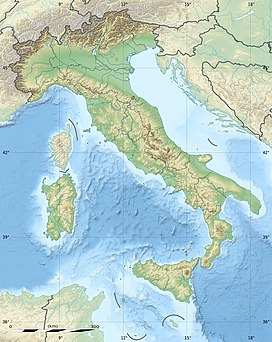Mount Somma
| Mount Somma | |
|---|---|
| Monte Somma | |
 | |
| Highest point | |
| Elevation | 1,132 m (3,714 ft) |
| Geography | |
| Location | Province of Naples, Italy |
| Parent range | Somma-Vesuvius |
| Geology | |
| Age of rock | 25,000 years before present |
Mount Somma is a mountain located in province of Naples, in the Campania region.
It is an integral part of the volcanic complex "Somma-Vesuvius." It has a height of 1,132 metres (3,714 ft).
Geography
Mount Somma is the remnant of a large volcano, out of which the peak cone of Mount Vesuvius has grown. Currently, Mount Somma appears to be spread in a semicircle around the north side and north-east of Vesuvius. Vesuvius's formation began in the collapsed caldera of Mount Somma.
Continuing to the east, encounter the first ridges:
- the "Cognoli di Trocchia" (961 m)
- the "Cognoli di Sant'Anastasia" (1.086 m)
- the "Punta del Nasone (Tip of the nose)" (1.132 m)
- the "Cognoli di Ottaviano" (1.112 m)
Punta del Nasone
A feature of Mount Somma is its highest point, which reaches 1,132 meters, called "Punta del Nasone," because of the similarity with a nose covered in the profile of a face lying along the top of the mountain. This similarity can be seen by looking the Mount Somma from the peak of Vesuvius.
Lava flows of 1944
Spectacular lava flow that interrupted the outline of the mountain down to the town of San Sebastiano al Vesuvio. A fascinating hiking trail (No. 9 in the numbering of the Vesuvius National Park) allows to cross the entire large cast almost 200 meters.
The Olivella
The Olivella is a place more than 400 m on the north, in the territory of the municipality of Sant'Anastasia. It looks like a natural amphitheater on top of which is located above the outlet Olivella source, a short distance to the outlet is higher than the outlet of the source surmounted by a stone arch that was part of the aqueduct at the time wanted Ferdinando of Bourbon to get the water to Naples.
History
The first evidence of volcanic activity in this area dates back about 400,000 years ago, but the first major eruptive phenomenon of some significance occurred about 25,000 years ago: the eruption of pumice base, when the top of the Somma volcano collapsed forming a caldera, in which later formed the Vesuvius. Today the caldera is only the northern side, which is Mount Somma.
Tourism
Since 1995 the Mount Somma has been the part of the Vesuvius National Park.

